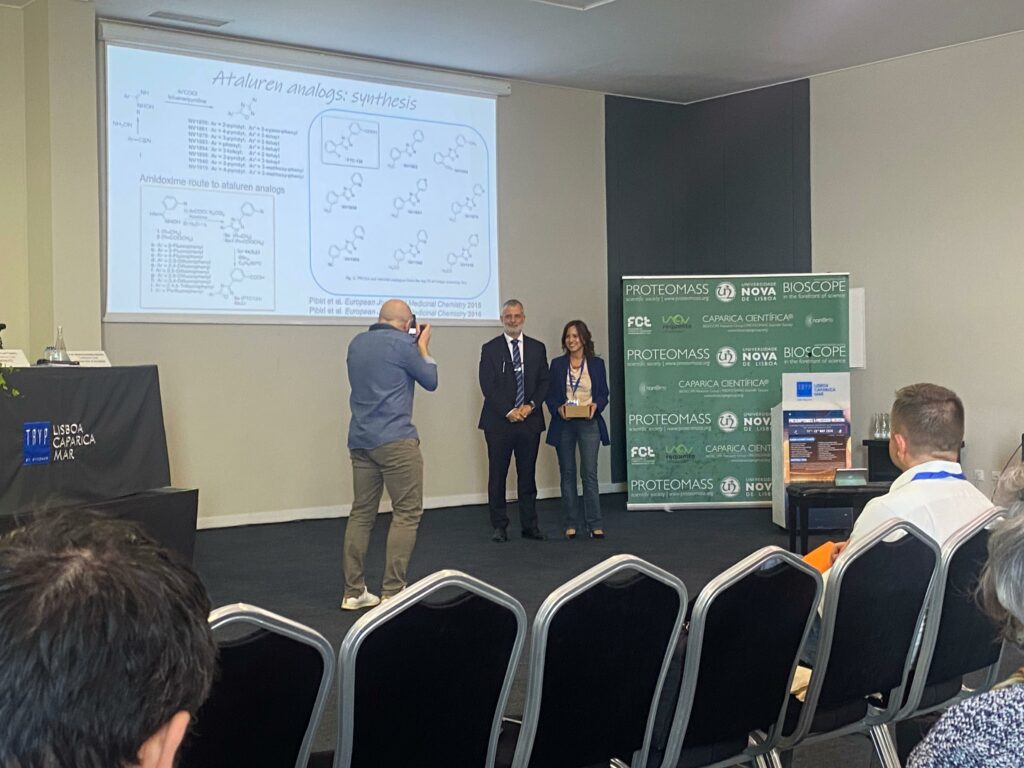Professor Ivana Pibiri has received an invitation to attend as a Keynote speaker at the first Caparica International Conference on Prescriptionomics and Precision Medicine 2024, held from 10 to 13 May 2024 in Caparica, Lisbon, Portugal.
The conference featured leading experts in this field, including plenary speakers Benedikt Brors of the German Center for Cancer Research, Rong Fan of the Yale School of Medicine, Anil Korkut of the MD Anderson Cancer Center, and Forest White of the MIT Center for Precision Cancer Medicine.
In addition to the keynote speech entitled “Fighting Nonsense by Next-Gen Therapeutics: a Precision Medicine Approach Based on Translational Readthrough Inducing Drugs.”, a further contribution from Professor Pibiri’s research group was the poster entitled: “Identification of new Translational Readthrough Inducing Drugs”, authors: D. Ricci,A. Peace, M. Tutone, C. Rizzo, I. Fiduccia, E. Vitale, I. Cruciata, F. Corrao, R. Melfi, L. Lentini,I. Pibiri. The contribution presented by doctoral student Davide Ricci, in the second year of his PhD in Molecular and Biomolecular Sciences, who won the award for best poster at the Conference.
The conference was strongly focused on precision medicine, the primary objective of the Heal Italia network. And it was conceived to be an exclusive event, with no more than 150 participants. This deliberate limitation of size with the aim of ensuring the presence of pioneers in the field of prescriptomics and precision medicine. The goal was to create a focused, high-level environment conducive to fostering new collaborations and building teams that will drive future advances in this innovative area of medical research and practice. This approach underlines the conference’s commitment to advancing the frontiers of precision medicine and prescriptomics.

The importance of prescriptomics and precision medicine in the 21st century is highlighted by advances in mass spectrometry, omics technologies and artificial intelligence. Prescriptomics is an emerging field that focuses on the complex interplay between genetics, proteomics, transcriptomics, metabolomics, and epigenetics and their impact on the efficacy, safety, and response to prescription drugs and precision medicine. This approach goes beyond conventional methods, aiming for a transformative paradigm that allows for the precise customization of treatment strategies. This leads to minimized adverse effects and optimized therapeutic outcomes, marking a significant shift towards precise and personalized medicine.
The conference covered various topics, including the use of omics technologies for diagnostic purposes, sample collection and manipulation techniques, effective patient follow-up strategies, bioinformatics, leveraging artificial intelligence to improve the accuracy of prescriptions, precision in prescription management and insights into precision and personalized therapies.
This event highlights the rapid evolution and importance of prescriptomics and precision medicine in contemporary healthcare, highlighting the role of cutting-edge technologies in the advancement of this field.
The pioneering research conducted by Prof. Ivana Pibiri and Laura Lentini on rare diseases has led to a profound understanding of translational readthrough inducing drugs (TRID), essential molecules capable of restoring protein synthesis compromised by nonsense mutations in DNA. Nonsense mutations, which account for approximately 11% of genetic diseases, introduce premature termination codons (PTCs) into the mRNA coding for a specific protein, resulting in premature arrest of protein synthesis.
The EMA-approved TRID Ataluren faces market suspension, underscoring the critical need for new solutions in the treatment of genetic disorders originating from nonsense mutations. Prof. Pibiri’s research has led to the identification of three new molecules, now patented and subjected to rigorous preclinical screening for various conditions including cystic fibrosis, Schwachman Diamond syndrome, primary immunodeficiency, choroideremia, hemophilia, Fabry disease and muscular dystrophy. Duchenne.

Over the years, Prof. Pibiri has obtained funding from the Italian Foundation for research on cystic fibrosis, co-directing a research group together with Prof. Laura Lentini. He currently leads his team within the PNRR HEAL ITALIA project, he is also Principal Investigator for the National PRIN Project funded by the Italian Ministry of University and Research (2023-2025) and Principal Investigator of the local Unit in a PNRR PoC ( 2024-2026).
Prof. Pibiri’s multidisciplinary research group includes geneticists, molecular biologists, physiologists, computational chemists and organic chemists, working collaboratively within the Department of Biological, Chemical and Pharmaceutical Sciences and Technologies, continuing to advance significant advances in the field of rare genetic diseases, offering hope for better treatments and outcomes.

